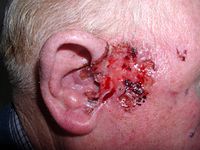
Photo from wikipedia
Hepatocellular carcinoma (HCC) is the most common form of primary liver cancer. γδ T cells have been revealed to be promising candidates for immunotherapy in patients with HCC. However, the… Click to show full abstract
Hepatocellular carcinoma (HCC) is the most common form of primary liver cancer. γδ T cells have been revealed to be promising candidates for immunotherapy in patients with HCC. However, the use of these cells in clinical practice has been demonstrated to be challenging. In the present study, γδ T cells isolated from the peripheral blood of patients with HCC (n=83) and healthy donors (n=15) were characterized. Flow cytometry was used to analyze the proportion, phenotype, tumor-killing capacity and cytokine secretion of regulatory T cells (Tregs) and γδ T17 cells in peripheral blood samples prior to and following amplification. Interleukin (IL)-17A levels in the supernatant was analyzed using an ELISA on days 3, 7, 10 and 14. The in vitro cytotoxicity of γδ T cells was measured using an MTT assay. It was revealed that zoledronate with IL-2 may efficiently expand γδ T cells sourced from the peripheral blood of patients with HCC. The amplification capacity of γδ T cells was associated with the clinicopathological characteristics of patients (clinical stage, levels of AFP and albumin, duration of disease, size and number of tumors, numbers of Tregs and γδ T17 cells, and levels of IL-17A). The proportion of γδ T cells positive for interferon-γ, tumor necrosis factor-α, granzyme B, perforin, and lysosome-associated membrane protein 1 was almost unchanged prior to and following amplification. Following amplification, the in vitro cytotoxicity of γδ T cells also remained unchanged. γδ T17 cells, Tregs and IL-17A levels were not altered during amplification. In summary, following in vitro amplification, circulating γδ T cells were revealed to possess features that may make them suitable for immunotherapy for HCC without increasing immunosuppressive factors. However, immunotherapy should be individualized according to the clinicopathological features of patients.
Journal Title: Oncology Letters
Year Published: 2018
Link to full text (if available)
Share on Social Media: Sign Up to like & get
recommendations!